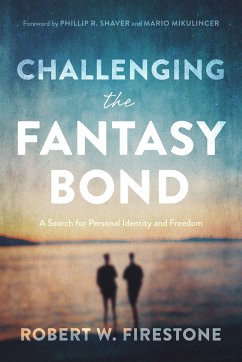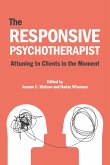- Broschiertes Buch
- Merkliste
- Auf die Merkliste
- Bewerten Bewerten
- Teilen
- Produkt teilen
- Produkterinnerung
- Produkterinnerung
This much-anticipated follow-up to the critically-acclaimed and bestselling The Fantasy Bond tackles the complex question of why so many of us are compelled to repeat the pain of our past while avoiding positive experiences that could enrich our lives.
Andere Kunden interessierten sich auch für
![Art Therapy Card Deck for Children and Adolescents: 50 Therapeutic Interventions for Challenging Clients Who Shut Down, Melt Down, or ACT Out Art Therapy Card Deck for Children and Adolescents: 50 Therapeutic Interventions for Challenging Clients Who Shut Down, Melt Down, or ACT Out]() Laura DessauerArt Therapy Card Deck for Children and Adolescents: 50 Therapeutic Interventions for Challenging Clients Who Shut Down, Melt Down, or ACT Out22,99 €
Laura DessauerArt Therapy Card Deck for Children and Adolescents: 50 Therapeutic Interventions for Challenging Clients Who Shut Down, Melt Down, or ACT Out22,99 €![From Challenging Behaviours to Distress Factors and Reactions From Challenging Behaviours to Distress Factors and Reactions]() Anna EliatambyFrom Challenging Behaviours to Distress Factors and Reactions21,99 €
Anna EliatambyFrom Challenging Behaviours to Distress Factors and Reactions21,99 €![The Responsive Psychotherapist The Responsive Psychotherapist]() The Responsive Psychotherapist73,99 €
The Responsive Psychotherapist73,99 €![Psychoanalytic Theory and Cultural Competence in Psychotherapy Psychoanalytic Theory and Cultural Competence in Psychotherapy]() Pratyusha Tummala-NarraPsychoanalytic Theory and Cultural Competence in Psychotherapy81,99 €
Pratyusha Tummala-NarraPsychoanalytic Theory and Cultural Competence in Psychotherapy81,99 €![The Ethical Lives of Clients The Ethical Lives of Clients]() William J DohertyThe Ethical Lives of Clients51,99 €
William J DohertyThe Ethical Lives of Clients51,99 €![The Heart and Soul of Change: Delivering What Works in Therapy The Heart and Soul of Change: Delivering What Works in Therapy]() The Heart and Soul of Change: Delivering What Works in Therapy86,99 €
The Heart and Soul of Change: Delivering What Works in Therapy86,99 €![The Science and Clinical Practice of Attachment Theory: A Guide from Infancy to Adulthood The Science and Clinical Practice of Attachment Theory: A Guide from Infancy to Adulthood]() Brian AllenThe Science and Clinical Practice of Attachment Theory: A Guide from Infancy to Adulthood69,99 €
Brian AllenThe Science and Clinical Practice of Attachment Theory: A Guide from Infancy to Adulthood69,99 €-
-
-
This much-anticipated follow-up to the critically-acclaimed and bestselling The Fantasy Bond tackles the complex question of why so many of us are compelled to repeat the pain of our past while avoiding positive experiences that could enrich our lives.
Hinweis: Dieser Artikel kann nur an eine deutsche Lieferadresse ausgeliefert werden.
Hinweis: Dieser Artikel kann nur an eine deutsche Lieferadresse ausgeliefert werden.
Produktdetails
- Produktdetails
- Verlag: American Psychological Association (APA)
- Seitenzahl: 327
- Erscheinungstermin: 15. Februar 2022
- Englisch
- Abmessung: 227mm x 151mm x 18mm
- Gewicht: 486g
- ISBN-13: 9781433835810
- ISBN-10: 1433835819
- Artikelnr.: 62715649
- Herstellerkennzeichnung
- Libri GmbH
- Europaallee 1
- 36244 Bad Hersfeld
- gpsr@libri.de
- Verlag: American Psychological Association (APA)
- Seitenzahl: 327
- Erscheinungstermin: 15. Februar 2022
- Englisch
- Abmessung: 227mm x 151mm x 18mm
- Gewicht: 486g
- ISBN-13: 9781433835810
- ISBN-10: 1433835819
- Artikelnr.: 62715649
- Herstellerkennzeichnung
- Libri GmbH
- Europaallee 1
- 36244 Bad Hersfeld
- gpsr@libri.de
Robert W. Firestone, PhD, is a clinical psychologist and author whose principle focus has been the subject of resistance in psychotherapy and people’s resistance to a better life in general. His comprehensive body of written work elucidates how the avoidance of the true nature of the human condition contributes to interpersonal pain and suffering as well as to the crisis of fellowship in which we, as a species, find ourselves. Dr. Firestone is the author of fifteen other books including Voice Therapy, Compassionate Child-Rearing, Fear of Intimacy, The Self Under Siege, The Ethics of Interpersonal Relationships, Beyond Death Anxiety, and The Enemy Within. Dr. Firestone is the consulting theorist for The Glendon Association. His studies on negative thought processes and their associated affect have led to the development of Voice Therapy, a therapeutic methodology used to uncover and contend with aspects of self-destructive and self-limiting behaviors. The concept of the critical inner voice has been applied to empirical research, developing The Firestone Assessment of Self-destructive Thoughts (FAST) and The Firestone Assessment of Violent Thoughts (FAVT), scales that assess the potential for suicide and violence. Dr. Firestone has also produced 35 documentaries with The Glendon Association.
Foreword—Phillip R. Shaver and Mario Mikulincer
Acknowledgments
Introduction
I. Introduction to the Fantasy Bond
1. The Fantasy Bond and Separation Theory
2. The Fantasy Bond in the Couple and Family
II. Dimensions of the Fantasy Bond
3. Idealization of Parents and the Family
4. The Negative Self Concept
5. Projection and Incorporation of Parents' Negative Traits
III. Behavioral Manifestations of the Fantasy Bond
6. Inwardness and the Loss of Feeling
7. Withholding
8. Self-Nourishing Habits and Addictions
9. Individuation, Regression, and the Fantasy Bond
10. Sexuality
IV. Implications for Psychotherapy
11. My Approach to Psychotherapy
12. Voice Therapy
V.¿ Theoretical Issues
13. Death Anxiety
14. Society and Conformity
15. Polarization, Prejudice, and Ethnic Warfare
Notes
References
Index
About the Author
Acknowledgments
Introduction
I. Introduction to the Fantasy Bond
1. The Fantasy Bond and Separation Theory
2. The Fantasy Bond in the Couple and Family
II. Dimensions of the Fantasy Bond
3. Idealization of Parents and the Family
4. The Negative Self Concept
5. Projection and Incorporation of Parents' Negative Traits
III. Behavioral Manifestations of the Fantasy Bond
6. Inwardness and the Loss of Feeling
7. Withholding
8. Self-Nourishing Habits and Addictions
9. Individuation, Regression, and the Fantasy Bond
10. Sexuality
IV. Implications for Psychotherapy
11. My Approach to Psychotherapy
12. Voice Therapy
V.¿ Theoretical Issues
13. Death Anxiety
14. Society and Conformity
15. Polarization, Prejudice, and Ethnic Warfare
Notes
References
Index
About the Author
Foreword—Phillip R. Shaver and Mario Mikulincer
Acknowledgments
Introduction
I. Introduction to the Fantasy Bond
1. The Fantasy Bond and Separation Theory
2. The Fantasy Bond in the Couple and Family
II. Dimensions of the Fantasy Bond
3. Idealization of Parents and the Family
4. The Negative Self Concept
5. Projection and Incorporation of Parents' Negative Traits
III. Behavioral Manifestations of the Fantasy Bond
6. Inwardness and the Loss of Feeling
7. Withholding
8. Self-Nourishing Habits and Addictions
9. Individuation, Regression, and the Fantasy Bond
10. Sexuality
IV. Implications for Psychotherapy
11. My Approach to Psychotherapy
12. Voice Therapy
V.¿ Theoretical Issues
13. Death Anxiety
14. Society and Conformity
15. Polarization, Prejudice, and Ethnic Warfare
Notes
References
Index
About the Author
Acknowledgments
Introduction
I. Introduction to the Fantasy Bond
1. The Fantasy Bond and Separation Theory
2. The Fantasy Bond in the Couple and Family
II. Dimensions of the Fantasy Bond
3. Idealization of Parents and the Family
4. The Negative Self Concept
5. Projection and Incorporation of Parents' Negative Traits
III. Behavioral Manifestations of the Fantasy Bond
6. Inwardness and the Loss of Feeling
7. Withholding
8. Self-Nourishing Habits and Addictions
9. Individuation, Regression, and the Fantasy Bond
10. Sexuality
IV. Implications for Psychotherapy
11. My Approach to Psychotherapy
12. Voice Therapy
V.¿ Theoretical Issues
13. Death Anxiety
14. Society and Conformity
15. Polarization, Prejudice, and Ethnic Warfare
Notes
References
Index
About the Author








